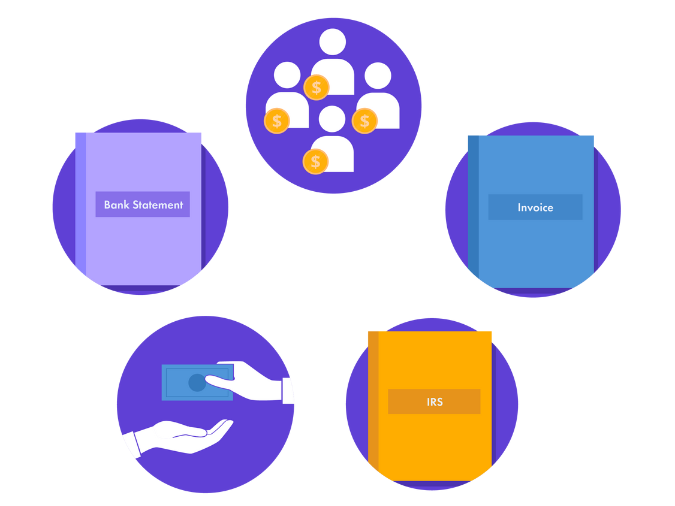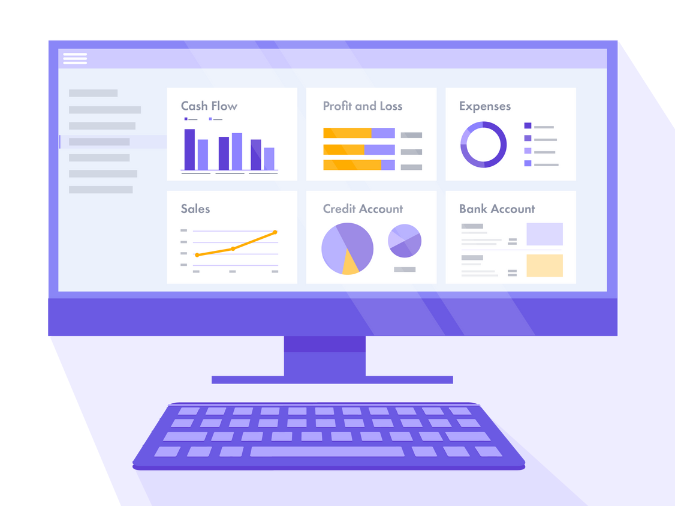Do You Need a Bookkeeper for Your Small Business?

A bookkeeper is an administrative professional who maintains financial information for clients or employers. A bookkeeper’s roles and responsibilities are adjacent to but distinct from an accountant’s. Bookkeepers record, organize, and track financial data for internal use.
Make a Free Invoice NowAs a small business owner or freelancer, it’s hard to know which business-maintenance tasks to take on yourself and which ones to delegate. Particularly concerning finances, you might be a bit out of your depth. With costly consequences for mistakes, the question of whether to hire a bookkeeper is essential to consider.
What Does a Small Business Bookkeeper Do?

The type and scale of a business determine its bookkeeping needs. Many small-business bookkeepers are freelancers or small business owners themselves. They offer a lot of flexibility regarding the scope of work they can handle. A small business bookkeeper performs any number of daily, weekly, monthly, quarterly, and annual tasks, including but not limited to:
- Managing bank accounts and transactions (tracking sales and purchases, monitoring cash flow);
- Maintaining records (checking that sales orders, invoices, receipts, and bank statements are consistent and no errors are made as data is entered or transferred);
- Preparing for tax season (keeping income, expenditure, and deduction information accurate, current, and documented);
- Maintaining the books on the right side of tax law (ensuring deductions, investments, and other financial moves are in keeping with the current year’s tax codes);
- Making payments to vendors and suppliers;
- Managing payroll; and
- Interfacing closely with the business’s or client’s accountant to prepare them thoroughly for tax return filing.
Hiring a bookkeeper can be economical and straightforward if you’re good at managing invoicing and payroll and just need help keeping current with accounts payable and receivable. If, on the other hand, you have no head for numbers and no desire to improve, perhaps handing over accounts and accountant contact information to a full-time trusted bookkeeper is the best bet.
Do I Need a Bookkeeper for My Small Business?
Maybe. As a small business owner or freelancer, financials are less complex and more manageable in scale than those of a large company. Depending on what your business does and how big it is, the ins and outs of its finances might be so simple that it makes the most sense to do your own bookkeeping. A freelance writer, for example, with minimal and straightforward business expenses, little to no overhead, and a simple business checking account, might find bookkeeping a minuscule task.
But, if your business is your sole source of income, or you want to uplevel your side hustle into the real deal, hiring a professional bookkeeper is one way to set the groundwork for scalability founded on financial integrity. Bookkeepers keep the fine line between personal and business finances very clear. They can also nip reporting mistakes in the bud by managing transactions and reconciliations in real time, which means little to no tax-day surprises.
The overall financial health of your business is best monitored by a professional bookkeeping and accounting team that work closely together. This dynamic frees you up to manage the rest of business operations. Use professional bookkeepers’ targeted skills to streamline and improve your business processes.
How Much Does a Bookkeeper Cost?

The cost of bookkeeping services ranges widely – from $500 to $3,500 monthly. The main factors that affect pricing are geographic location, experience level, unique expertise, project or job scope, and the nature of the bookkeeping business (freelance vs. corporation or agency).
Start with a maximum budget for hiring a bookkeeper and work backward based on the division of labor – what responsibilities will you continue to manage on your own, and how many will you hand off to the bookkeeper?
Hourly bookkeepers typically charge about $20 per hour to complete basic tasks, which can be an economical approach to hiring, particularly if your needs fluctuate from month to month. Beyond hourly rates, other payment models include per-project flat rates for distinct scopes of work, recurring flat monthly fees, and a la carte packages customized for your specific needs.
How to Find a Small Business Bookkeeper in Your Industry
There are plenty of great generalist bookkeepers out there. You can either search locally, use a board like the Bill.com Find an Accountant page (there’s a dropdown menu where you can select “Bookkeeper”) for corporate offerings or try Upwork for freelance professionals.
A local search makes the most sense if you want to meet with a bookkeeper in real life. Your network is your most valuable tool — other trustworthy small business owners in similar industries are the best referral sources.
Suppose you work in an industry with particular financial needs, or the industry itself is very niche. In that case, a bookkeeper who specializes in what the business does or offers may best serve you. Onboarding will be faster and simpler, and the bookkeeper will likely have some industry-specific tricks up their sleeve they can pass on to our business.
Alternatives to Bookkeepers

If hiring a traditional bookkeeper isn’t the right choice for your business (whether for budgetary or other reasons), two other options exist: DIY self-management and online bookkeeping services. Each has benefits and drawbacks and, when performed correctly, can be viable solutions for a wide range of businesses.
Self-Management
Keeping your own books can be empowering, frugal, and relatively simple, or a chaotic and expensive nightmare. The ability to accurately assess your business’s needs alongside your own relative skills is key to simplicity, so start by breaking down the tasks required to perform as your own in-house bookkeeper.
Going in with an unstructured sense of “keeping track of stuff” is not a plan — it’s a recipe for disaster. Break bookkeeping tasks into daily, weekly, monthly, and yearly chunks, and then ask yourself if you can do a diligent and thorough job.
If the answer is yes, start using software like QuickBooks. Or, if you’re into full DIY, create the spreadsheets, calendar reminders, and files needed to do the work. Treat it like a job, take it seriously, and accept that it will be a lot of work for a while. Once you become deft at the role, it will come as naturally as brushing your teeth.
Online Bookkeeping Services
If you know that full DIY isn’t the best choice for your business but don’t want to commit to a single bookkeeper, there is an excellent category of remote bookkeeping software and services that can bridge the gap.
Keeper is a highly cost-effective ($16 monthly) bookkeeping app designed with freelancers and small business folks in mind. It works best for one-person businesses and provides resources to track expenses, assistance with filing self-employment taxes, and customer support from live tax professionals.
When you sign up, it scans the previous year and a half’s worth of purchases on any linked bank account or credit card. It uses this information to identify potential tax write-offs and provides a formal report.
Pro Service, Pro Prices
One of the most significant values of hiring a professional bookkeeper is peace of mind. Bookkeeping is their expertise; if you hire well, they’ll be great at their job. You can rest easy knowing that every financial “i” is dotted and “t” is crossed.
On the other hand, bookkeeping is not an esoteric or highly gatekept skill — anyone can develop strong bookkeeping skills if they have the desire and the diligence, thereby saving the additional cost of hiring a professional. Only you can make the right decision for your unique situation, so consider carefully and choose wisely.


